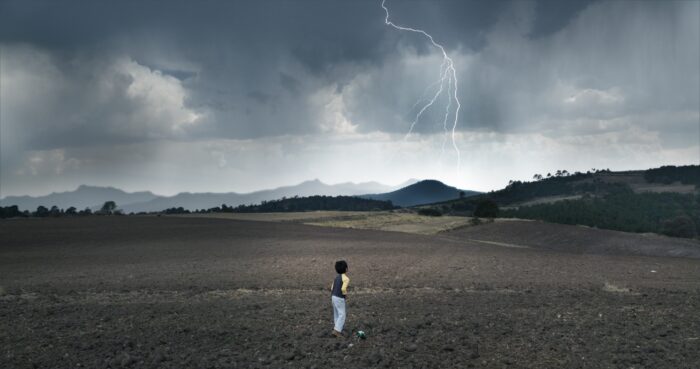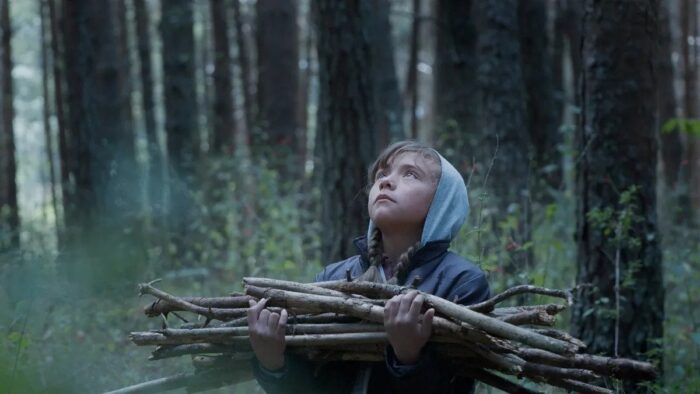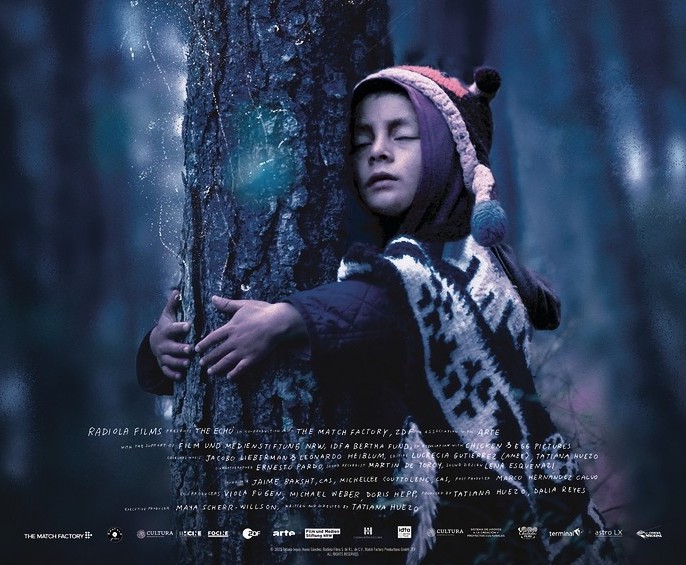This review was originally published by Sounds and Colours here.
Tatiana Huezo’s award-winning feature-length documentary, El eco (The Echo, 2023), is masterful. The film sensitively and poetically presents a year in the life of the rural Mexican community of El Eco in just 102 minutes, telling its inhabitants’ stories from within the community.
El Eco in Chignahuapan, Puebla, is a magical place at 3,000 metres above sea level where life is dictated by the seasons: harvests, sun, storms and breeding cycles. El Eco has tall creaking pines, lakes like mirrors, sun that leathers the skin and mist that covers everything from sight. We view El Eco through the eyes of its younger generations: children and adolescents learning what it means to grow up and discover the adult world, who will soon be responsible for looking after the land, the animals, the crops and each other.

We follow three families, although it is hard to distinguish who belongs to which family exactly; they all belong to El Eco. Cheeky Toño, the youngest, is beginning to understand life in the campo as a boy. His more pensive sister, Luzma, is learning that caring for their sheep is only one part of women’s work on the farm. Sarahí dreams of going to high school and becoming a teacher. She practices teaching classes to her dolls, nailing the pedagogical tone. Montse looks after her ageing grandmother, the first woman in El Eco, who’s nearing her end. Intimate shots in their home show Montse bathing her and feeding her. With a rebellious and liberated spirit, Montse breaks in horses and is determined to ride in the local races, assumed to be for boys only.
Huezo’s lens perfectly captures facial expressions – betraying awe, pain, confusion, desire, disappointment, joy. It’s a thing of wonder to feel you’re seeing once again from a child’s eyes. She captures minute yet life-changing details, like dipping your feet in the newfound river of a waterlogged field and watching as they appear to propel you through the water when really you’re not moving at all; catching a blessing of light on your hands, on your face, perhaps in the moment you need it most; hearing the corn crackling in the field and learning that this means the time’s come to harvest.
El eco is not a typical documentary: there’s no investigation, no interviews, no narrative voiceover, no scripted dialogue. According to Huezo, they simply used an ‘open script’ with characterisation and predicted storylines, so “the challenge was to follow these characters and to be attentive … to capture these moments of purity with a mise-en-scène”. The camera and crew are imperceptible, as if hidden in the shadows. Nevertheless, El eco has been painstakingly crafted and often feels like a work of fiction.
Sensitive editing from Lucrecia Gutiérrez plays an important role in implying emotions and moving the audience. We read worry in Luzma’s face, illuminated by a crack of light from her bedroom door left ajar, and assume she is listening in on her parents’ tough conversation about swapping roles for a week to understand each other’s daily toil. We read disappointment and determination in Sarahi’s eyes after hearing her mother tell her that for now, she can’t go to high school although she’s saved up some money. We hear longing in the New Mexican Folk song ‘Sí tú serás el viento’ that plays in Montse and her friend Bere’s headphones out on the plains. Huezo told El Pais, “I worried that daily life perhaps wasn’t enough [to make a film out of], but it is. That’s what I learned.”

The sound design by Lena Esquenazi (Monos, 2019) and mixing by Jaime Baksht (The Sound of Metal, Pan’s Labyrinth) and Michellee Couttolenc (Sound of Metal, Los reyes del mundo) are impeccable, with the echoes of a condor’s whistle poetically melding with the wind, the creaks of the house, the pines and the next day dawning. The squelch of mud underfoot is almost tangible, the pop of a bean being plucked from its runner is humorous and tactile. As Huezo told Crónica magazine; “Sound is a very sensorial tool, it awakens our senses, awakens things in our skin, in our hearts or in our bellies.”
Time in El Eco is related to work and seasons, not to personal dramas. Reflecting this, the narrative of El eco is non-linear. However, it is plain to see that over the period of about a year here there are torrential rains, raging storms, burning sun, a fatal drought and an abundant autumn. Weather is extreme and the seasons are becoming more unpredictable.
To live as they do, the families of El Eco need as many extra hands as possible. But what does this mean for the children’s dreams? Will capitalism and climate change –causing further inequality and extreme weather in the countryside– force them to leave El Eco, or will they find a way to mould their own lives in the community?
As Toño’s father tells them: “Work is work. It’s not easy but you have to do it with love.” There is love in Huezo’s gaze too, there is love in Ernesto Pardo’s gentle and wondrous photography, the focus on eyes, on expressions, on experiences, the fact of presenting this remote, mysterious town as the centre of the world.
In her acknowledgements speech at Berlinale after winning Best Director (or perhaps after winning Best Documentary) Huezo thanked her team “for bringing [to the screen] the eco and incredible light of these children and their families from rural Mexico who, with their tenderness and great dignity, showed us that caring for each other is also an act of resistance.”
Tatiana Huezo (1972) is the author of seven films including shorts, documentaries and the feature film, Prayers for the Stolen (Noche de fuego, 2021), which won a special mention at Cannes in 2021. El eco won Best Director and Best Documentary at Berlinale (Berlin International Film Festival) and screened at FICCI – Festival Internacional de Cine de Cartagena de Indias at the end of March, to a full house.

